College Vacation Scholarships – Student Experiences
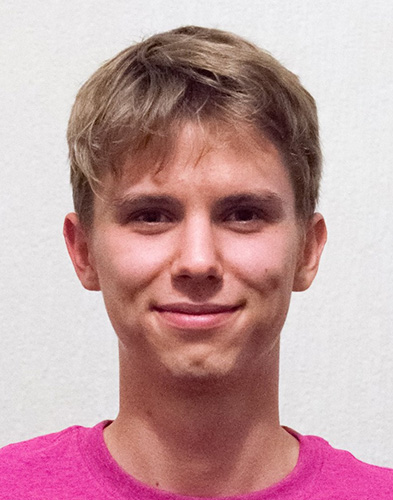
Malthe Sporring
A summer of topology
This summer, I was lucky to receive funding for a project on homology theory, a topic in Algebraic Topology, from the School of Mathematics Vacation Scholarship and College Vacation Scholarship funds. In homology theory, you assign to each topological space a sequence of abelian groups, called homology groups, which encodes the topological properties of the space and allows you to study them in the language of algebra. The results are fascinating: why does every map from the open disk to itself have a fixed point? Why are there always two antipodal points on Earth with the same temperature and barometric pressure? Why can we extend the reals to the complex numbers, quaternions, and octahedrons, but go no further (without gaining zero divisors)?
It was wonderful to fully engross myself in a single topic and to have the freedom to pursue any result that inspired me. I spent most of my summer in my local park, baking in the warm sun, reading dusty leatherbound books from the fifties. If that sounds like your kind of summer, then you simply must apply for a project of your own!
Malthe Sporring
Mathematics (MMath Hons) 4th year
Key barriers to transition to a sustainable fashion industry
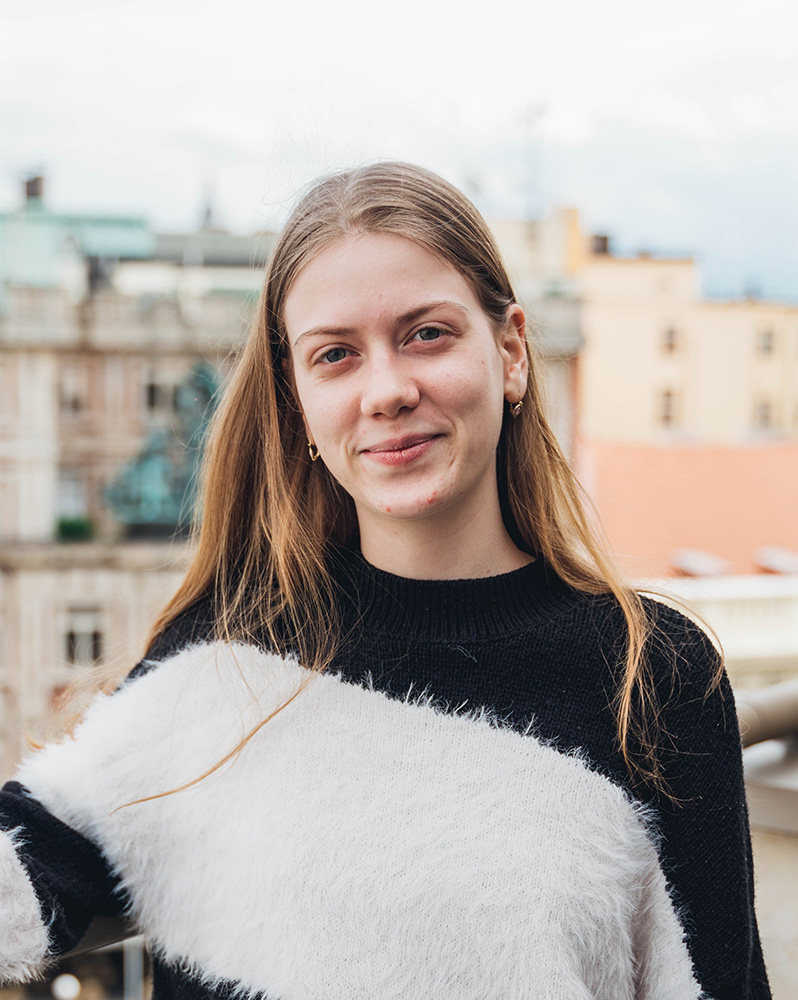
Sharka Ondrouchova
This summer I was lucky to be awarded a College Vacation Scholarship from the School of Science and Engineering to complete a project on Key barriers to transition to a sustainable fashion industry; a hot topic in both fashion and sustainability circles necessary for a climate friendly but creatively unrestricted future. After a literature review of about 90 papers and stakeholder analysis, I identified 3 main barriers:
Firstly, sustainability of the fast fashion industry is constrained by inherent characteristics of the supply chain, such as fast turnover and short lead times. Secondly, small unassociated yet sustainable changes are slowing the transition as they seem to legitimize unnecessary purchases. And most importantly, innovation driven by sustainability is more complicated than innovation driven by finance and efficiency.
Although I did search for barriers, the literature review showed that public perception is changing, allowing radically more for second-hand purchases in the Western societies and a shift in paradigm to a circular, and more sustainable fashion.
This was a great opportunity to stay focused on my future goals and take the time to analyze and read much of the recent research on sustainable fashion. A thank you goes to all that supported me during the process, particularly my supervisor Alfy-Gathorne Hardy and the College team.
Sharka Ondrouchova
GeoSciences Ecological and Environmental Sciences (BSc Hons) 3rd year
An excellent opportunity for me to explore
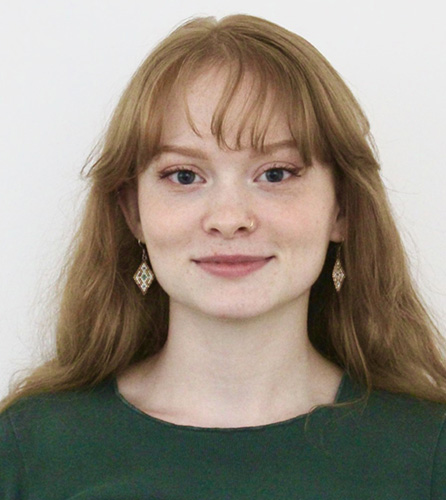
Luisa Schrempf
My EPSRC-funded research internship with The University of Edinburgh’s School of Physics and Astronomy titled “An Exploration of the Advantages of Disclinations in Lyotropic Nematic Liquid Crystals” provided an excellent opportunity for me to explore a fascinating area of physics. The goal of my project was to create a proof of concept for an innovative way to create strings of conductive particles in lyotropic nematic liquid crystals. Such technology could be used to create high efficiency organic solar cells or conductive inks and glues, which are, for example, used in supply chains. During the project, I thoroughly enjoyed familiarising myself with polarising and confocal microscopy and, besides gaining insight into the behaviour of my samples, I was able to take stunning photographs of liquid crystals, nanoparticle dispersions and glues. By modifying a regular rheometer, which displaces two parallel plates surrounding the sample and measures its dynamic response, I could draw conclusions on the correlation of the electrical and mechanical properties of the nanoparticle dispersions. The results of the project are promising, and I am looking forward to continuing it throughout the coming academic year and beyond. If the technology proves successful, I am eager to create and test prototypes for organic solar cells.
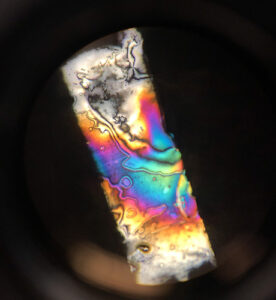
Glue under crossed polarisers
I immensely enjoyed the autonomy of the project, as I was able to design and conduct experiments by myself. The outcome of the project far exceeded my expectations, and I have gained new confidence with previously unfamiliar equipment. I believe the project has consolidated my research skills and I am ready and eager to tackle similar open-ended research projects in the future. Not least, I am very grateful to the College of Science and Engineering and the EPSRC for providing me with this opportunity.
Luisa Schrempf
Physics (MPhys) Year 4
Enlightening and exciting
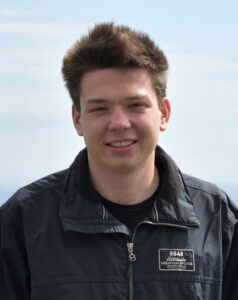
Jonathan Gustafsson Frennert
I had the opportunity to do an EPSRC Undergraduate Vacation Internship with the School of Mathematics over the summer. Looking back, it has been an enlightening and exciting snapshot of how university research is done.
The original aim of my internship was to fit a network model for polarization of political opinion on real-life data. I was fortunate to be supervised by Professor Desmond J. Higham, a coauthor of the model, whose article motivated me to apply for the internship.
Everything from writing the project proposal to discussing research results with my supervisor gave me a better understanding of the research process. A big takeaway I got from the experience was that your research aims will often change as you dig deeper into a problem. During the internship, I realized that none of the datasets I had gathered for the project had opinion values along a political axis, even though they were collected in a political context. I spent the rest of my internship creating and testing a political opinion metric for two-party systems using sentiment analysis. I ended up far from where I started, but I had a fun time and got to create something useful.
I would recommend the internship to anybody wanting to learn more about university-level research or have a research problem they want to explore. Personally, this experience has greatly motivated me towards a career in research.
Jonathan Gustafsson Frennert
Informatics Computer Science and Mathematics (BSc Hons) 2nd year
Dynamical systems and mathematical biology
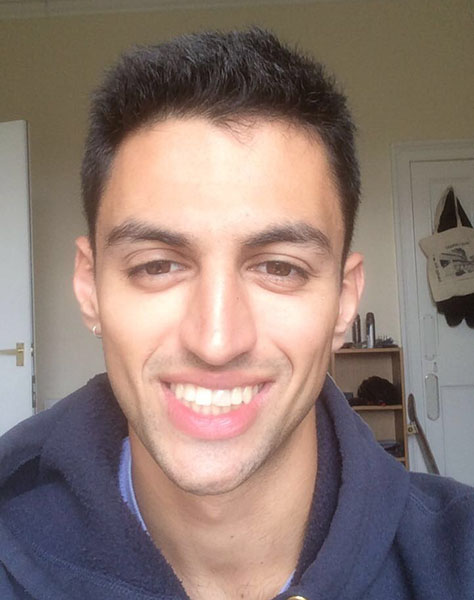
Zak Sattar
Throughout University, I have wished to pursue a career in academic or industrial research in mathematics. In February 2021, I had the chance to complete a research project under the supervision of Dr Nikola Popovic, in the areas of dynamical systems and mathematical biology. Together, we constructed a project proposal and submitted it to the College of Science and Engineering and then to the Engineering and Physical Sciences Research Council (EPSRC), which supported 10 weeks of funding in open competition.
Work began by replicating and extending the results of a paper entitled “A Mathematical Model of the Transition from Normal Hematopoiesis to the Chronic and Accelerated-Acute Stages in Myeloid Leukemia”. This paper introduces a planer system of ordinary differential equations and provides numerical and analytic analysis. I reformulated the planar system into a fast-slow system and then analysed the singular geometry. Together with numerical simulations, we were able to provide a deep understanding of the fast-slow system and relate this back to the underlying biology. We also identified two model extensions and analysed them in a similar way.
This project gave me a taster into research, which I enjoyed immensely. I would like to express my deep gratitude to Dr Popovic for developing this project and his patience in guiding me through various stages of the work, which helped me gain confidence in my abilities. My thanks also to the School of Mathematics at the University of Edinburgh and EPSRC for funding this project.
Zak Sattar
4th year Bsc Mathematics
An unforgettable experience
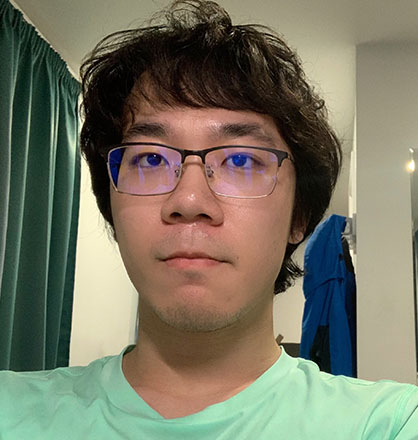
Jue Gong
I’m so happy that School of Mathematics offers a such great opportunity for our undergraduates to explore the knowledge which is beyond our course. You can not only see how to generalise what you have learnt in the past years under the supervision of a professional mathematician, but also analyse the previous course material from a new perspective. As the main area of our project is pure mathematics, specifically mathematical analysis, we always use examples to arise our questions which makes our discussions natural. If you are a math student and interested in it, I do recommend you study well in year 1 and 2 since I think the motivation of many projects comes from what you have gained.
Besides so fantastic for me to be awarded the vacation scholarship by College of Science and Engineering in the summer 2021! It’s an unforgettable experience and highlight in my university life. Honestly I have applied for two funds but only one of them supports me so I think we have a lot of excellent math students and the application processing is competitive. If you wish to see what the research life is, just go ahead 🙂
Jue Gong
Mathematics Mathematics and Statistics (BSc Hons) 2nd Year
Thermodynamic origami: A computational study of microscopic waterbomb patterns.
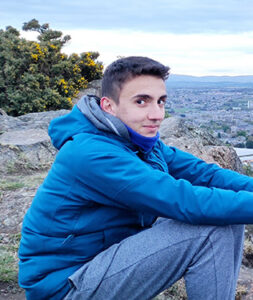
Matthaios Chouzouris
Scientists and engineers are gradually starting to use the wisdom given to us by some of the greatest origami artists, to invent intricate and elegant solutions for modern engineering problems. There are literally no limits to how one can fold something, and this allows for the construction of structures with many useful shapes and properties!
The focus of my project has been a particularly interesting origami called the waterbomb. Much like a switch, this origami usually has two stable positions in which it is happy to rest, and an intermediate position in which it cannot easily balance. This behaviour is called bi-stability.
We have simulated the motion of this origami in the context of a molecular dynamics environment, which basically means that the structure is being constantly kicked around by hypothetical molecules. While being kicked around, our origami is forced to adopt different conformations and often jumps between its two stable folded states. By studying and understanding this chaotic behaviour, we have managed to induce a phase transition in the origami’s dynamics, where we have merged the two stable states into one. In other words, we have managed to control whether a waterbomb will be bi- or mono-stable.
We aspire that our study can make a difference in the future construction of multi-functional, micro-origami devices.
Matthaios Chouzouris
Computational Physics (MPhys) Year 5
I got the opportunity to use a supercomputer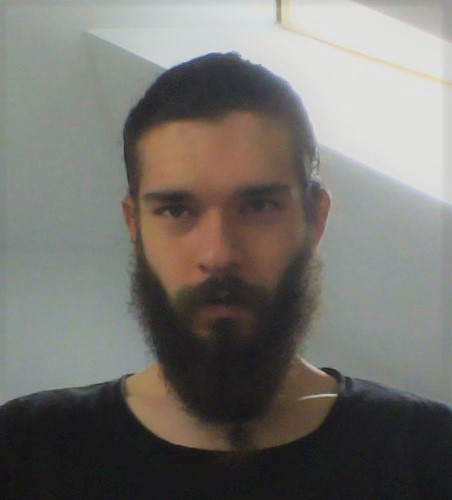
Hi everyone, my name is Szymon, I am a fourth-year chemistry student at the University of Edinburgh. I come from Warsaw, Poland. This summer I had the pleasure of being a recipient of the EPSRC scholarship.
For my project, I joined the Erastova Research Group at my university. The group is led by Dr. Valentina Erastova and focuses on computational chemistry—molecular dynamics, to be exact. Due to the pandemic, the entire project was done remotely, from the comfort of my home. Then again, since this was a computational chemistry project, it did not impact negatively on the project at all. Before undertaking the project, I had had a vague idea of what computational chemistry was and knew nothing about molecular dynamics. Thankfully, throughout the internship, I received support and guidance from Dr. Erastova and a PhD student, Rosie Wood!
The internship allowed me to develop my planning, organizational, analytical, and problem-solving skills. I switched from the Windows operating system to Ubuntu. I learned how to code in Bash and improved my Python programming skills. Additionally, for the first time in my life I got the opportunity to use a supercomputer. The project gave me an understanding of how such machines operate and what they are capable of.
All in all, I had a productive and enjoyable summer! The funding from the EPSRC allowed me to learn and do something interesting without being beset by any financial worries.
Szymon Kosc
Chemistry (MChem) year 4
Extremely rewarding experience
Being a recipient of the CSE Vacation Scholarship has been an intense, albeit extremely rewarding experience. Intense, because 6 weeks is barely enough time to begin to understand and research your topic in depth; but rewarding, because it gives you the opportunity to participate in research, hand in hand with a professional mathematician. At times it can be quite confusing: after all, you are engaging in a completely novel way with a mathematical problem, as it is up to you to derive conclusions, and choose which paths to follow, in order to answer your research question. Thankfully, the guidance and support of your supervisor is always available, and it makes the experience all the more fun. Beyond the skills That I have gained, both academically and in terms of time-management and communication, my main take away was that I had the opportunity to work on something that I was genuinely interested in, and perhaps more importantly, that the end-result, the result of my research, is something that I am truly proud of.
Antonio León Villares
Computer Sciences and Mathematics (BSc Hons) year 4




Recent comments